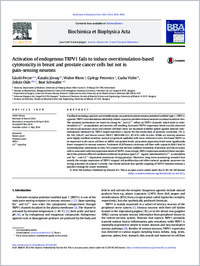Activation of endogenous TRPV1 fails to induce overstimulation-based cytotoxicity in breast and prostate cancer cells but not in pain-sensing neurons
- Pecze, László Anatomy, Department of Medicine, University of Fribourg, Switzerland
- Jósvay, Katalin Institute of Biochemistry, Biological Research Center of the Hungarian Academy of Sciences, Szeged, Hungary
- Blum, Walter Anatomy, Department of Medicine, University of Fribourg, Switzerland
- Petrovics, György Department of Surgery, Center for Prostate Disease Research, Uniformed Services University of the Health Sciences, Bethesda, USA
- Vizler, Csaba Institute of Biochemistry, Biological Research Center of the Hungarian Academy of Sciences, Szeged, Hungary
- Oláh, Zoltán Acheuron Hungary Ltd., Szeged, Hungary - Institute of Chemistry, Faculty of Material Science and Engineering, University of Miskolc, Hungary
- Schwaller, Beat Anatomy, Department of Medicine, University of Fribourg, Switzerland
-
11.05.2016
Published in:
- Biochimica et Biophysica Acta (BBA) - Molecular Cell Research. - 2016, vol. 1863, no. 8, p. 2054–2064
English
Vanilloids including capsaicin and resiniferatoxin are potent transient receptor potential vanilloid type 1 (TRPV1) agonists. TRPV1 overstimulation selectively ablates capsaicin-sensitive sensory neurons in animal models in vivo. The cytotoxic mechanisms are based on strong Na⁺ and Ca2 + influx via TRPV1 channels, which leads to mitochondrial Ca2 + accumulation and necrotic cell swelling. Increased TRPV1 expression levels are also observed in breast and prostate cancer and derived cell lines. Here, we examined whether potent agonist- induced overstimulation mediated by TRPV1 might represent a means for the eradication of prostate carcinoma (PC-3, Du 145, LNCaP) and breast cancer (MCF7, MDA-MB-231, BT-474) cells in vitro. While rat sensory neurons were highly vanilloid- sensitive, normal rat prostate epithelial cells were resistant in vivo. We found TRPV1 to be expressed in all cancer cell lines at mRNA and protein levels, yet protein expression levels were significantly lower compared to sensory neurons. Treatment of all human carcinoma cell lines with capsaicin didn't lead to overstimulation cytotoxicity in vitro. We assume that the low vanilloid-sensitivity of prostate and breast cancer cells is associated with low expression levels of TRPV1, since ectopic TRPV1 expression rendered them susceptible to the cytotoxic effect of vanilloids evidenced by plateau- type Ca2 + signals, mitochondrial Ca2 + accumulation and Na⁺- and Ca2 +-dependent membrane disorganization. Moreover, long- term monitoring revealed that merely the ectopic expression of TRPV1 stopped cell proliferation and often induced apoptotic processes via strong activation of caspase-3 activity. Our results indicate that specific targeting of TRPV1 function remains a putative strategy for cancer treatment.
- Faculty
- Faculté des sciences et de médecine
- Department
- Département de Médecine
- Language
-
- English
- Classification
- Biological sciences
- License
-
License undefined
- Identifiers
-
- RERO DOC 277380
- DOI 10.1016/j.bbamcr.2016.05.007
- Persistent URL
- https://folia.unifr.ch/unifr/documents/305051
Statistics
Document views: 134
File downloads:
- pdf: 215
